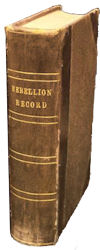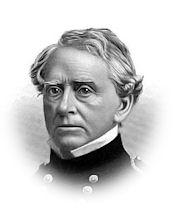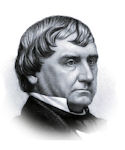ORDNANCE OFFICE,
Washington, D.C., January 3, 1861.
Hon. J. HOLT, Secretary of War:
SIR: I have the honor to acknowledge the reference to this office of a letter from the honorables Messrs. Yulee and Mallory, of the Senate, dated 2d instant, and, in compliance with their request, to report that there is only one arsenal in the State of Florida, and that is one of deposit only. It is called Apalachicola Arsenal, and is situated near the town of Chattahoochee, at the junction of the Flint and Chattahoochee Rivers. The arms, ammunition, &c., now at that post, are one 6-pounder iron gun and carriage, with 326 shot and canisters for the same, 57 flintlock muskets, 5,122 pounds of powder, 173,476 cartridges for small-arms, and a small quantity of different kinds of accouterments.
The ordnance and ordnance stores at the other military posts in Florida are as follows:
At Fort Barrancas.–Forty-four sea-coast and garrison cannon and 43 carriages, viz: Thirteen 8-inch columbiads and howitzers; two 10-inch mortars, and eleven 32, ten 24, five 18, and three 19-pounder guns; 3,152 projectiles for the same; 20,244 pounds of powder, and 2,966 cartridge bags.
At Barrancas Barracks.–A field battery, consisting of four 6-pounder guns and two 12-pounder howitzers, with carriages, and six caissons, with 300 projectiles and 270 cartridge bags for the same.
At Fort Pickens.–Two hundred and one sea-coast and garrison cannon, viz: Four 10-inch columbiads and four 10-inch mortars, fifty 8-inch and flanking howitzers, and two 42, sixty-two 32, fifty-nine 24, six 18, and fourteen 12 pounder guns, and 128 carriages for the same; also, 4,974 projectiles of all kinds; 3,195 grape-shot, loose; 500 24-pounder stands canister shot; 12,712 pounds of powder, and 1,728 cartridge bags.
At Fort Taylor.–Sixty sea-coast and garrison cannon, viz: Fifty 8-inch columbiads and ten 24-inch flanking howitzers, with caissons, and four 12-pounder field howitzers, mounted; 4,530 projectiles, suited to the guns; 34,459 pounds of powder; 2,826 cartridge bags; 962 priming tubes, and 759 cartridges for small arms.
At Fort McRee.–One hundred and twenty-five sea-coast and garrison cannon, including three 10-inch and twelve 8-inch columbiads; twenty-two 42, twenty-four 32, and sixty-four 24 pounder guns, with 64 gun carriages; 9,026 projectiles, and 1,258 stands of grape and canister, and 19,298 pounds of powder.
At Key West Barracks.–Four 6-pounder field guns and carriages; 1,101 rounds of shot and other ammunition for the same; 171 pounds of powder; 158 cartridge bags; 538 priming tubes; 7 rifles, and 2,000 rifle cartridges.
At Fort Marion.–Six field batteries, of four 6-pounder guns and two 12-pounder howitzers, and twenty sea coast and garrison cannon, viz: Four 8-inch howitzers and sixteen 32-pounder guns; also, six 6-pounder old iron guns, and 31 foreign guns of various calibers; 2,021 projectiles; 330 rounds of fixed ammunition; 873 priming tubes, and 931 pounds of powder. Also, 110 muskets, 103 rifles, 118 Hall’s carbines, 98 pistols, 147,720 cartridges for small-arms, and 15,000 percussion caps.
Very respectfully, your obedient servant,
WM. MAYNADIER,
Captain of Ordnance.










